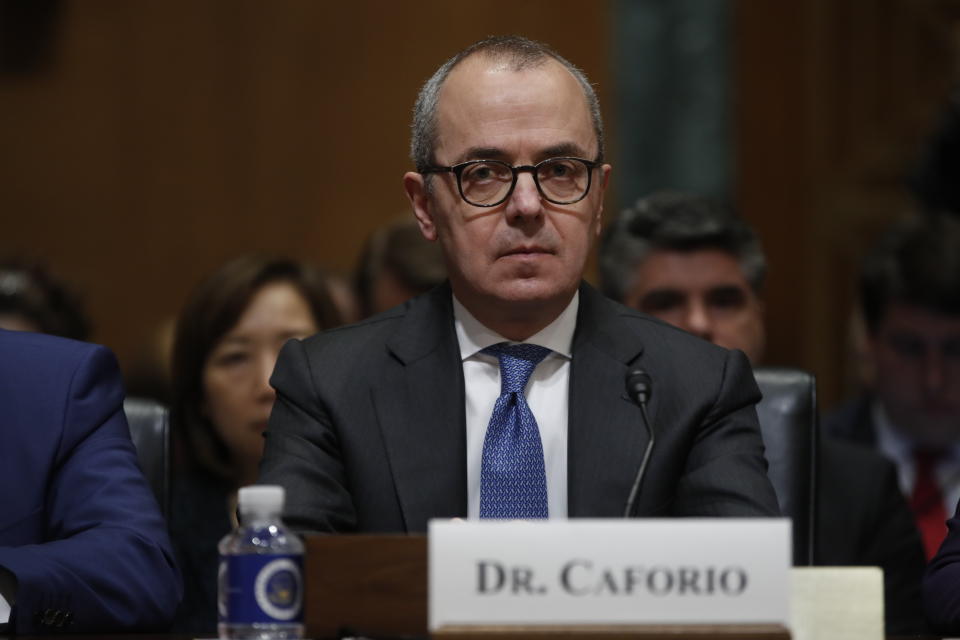Pharma giants eye 'period of change' as drug pricing talk heats up in DC
Bipartisan drug pricing legislation set to be debated in the U.S. Senate isn’t a concern just yet for major pharmaceutical giants — even as they acknowledge change is on the horizon amid mounting political pressures over costly medicine.
On their individual second-quarter earnings calls on Thursday, both officials at AstraZeneca ($AZN) and Bristol Myers-Squibb ($BMY) indicated it was too early to worry, as the situation in Congress remains fluid.
However, Bristol-Myers CEO Giovanni Caforio acknowledged that the industry would eventually feel the effects of policy changes.
“We are at the beginning of a period of change,” he told investors and analysts.
In its current form, the Prescription Drug Pricing Reduction Act (PDPRA) aims to cut prescription drug prices, primarily by taking aim at Medicare Part D costs. At least for now, the draft language isn’t a concern for Bristol Myers.
“While they are very punitive, in may ways, for the industry and companies focused on innovations, they benefit only 2% of patients in Medicare, and don’t address the misaligned incentives in the system,” Caforio said.
The company’s sales currently rely on about 25% on Medicare Part B, another 25% of sales comes from Part D — but according to BMS exposure to Medicare overall is low.
His comments underscored how different sides of the health care system continue to blame each other for surging drug price inflation.
Drug companies blame the insurance companies and pharmacy benefits managers (PBMs) for the increases in costs, while PBMs blame the drug companies for high prices. Meanwhile, insurance companies blame PBMs and drug companies for being in control of the costs.
Caforio added that the acquisition of Celgene ($CELG), which is still in the approval process, will help the company weather new laws and regulations.
“I felt it was important to us…to have a broader and more diversified portfolio that goes across multiple types of reimbursement,” Caforio said.
‘Too early’

AstraZeneca, which also reported second-quarter earnings on Thursday, was also constructive about the outlook on drug pricing legislation. The company’s sales range between 25% to 30% from Part D, according to CEO Pascal Soriot.
“It’s too early to make bold statements of the financial impact,” Soriot said. Still, he acknowledged that “certainly, there is a negative impact that can come form those changes.”
Both AstraZeneca and Bristol Myers agreed that transparency. and helping reduce the cost to patients, was a necessary policy outcome.
Yet even some patient advocates aren’t supportive of the Senate’s proposed approach. The Campaign for Sustainable Rx Pricing, which is lobbying for lower drug prices, believes the draft bill doesn’t hold drug companies accountable enough.
“We strongly recommend that the Committee further refine the policy to make Big Pharma assume an even greater portion of the reinsurance liability than the current 20 percent share in the package,” wrote executive director Lauren Aronson, in a letter sent to the committee Wednesday.
Aronson added that drug companies should “continue some responsibility in the earlier phase of the benefit, so that beneficiaries can save even more on out-of-pocket spending through lower premiums and reduced cost-sharing.”
A few senators voiced concerns, but said they’d support passing the bill out of committee Thursday.
“I think we need to continue refining this proposal to strike the right balance between preventing price increases and preserving a market-based approach that has made Part D a success,” Sen. John Cornyn (R-TX) said Thursday morning.
“It’s more important that we get (this) done right than get it done fast.”
In a statement emailed to Yahoo Finance on Thursday, industry lobbying organization PhRMA, said the drug bill would be disastrous for drug companies’ futures.
“The Senate Finance Committee legislation is the wrong approach to lowering drug prices,” the organization declared.
“It would siphon more than $150 billion from researching and developing new medicines and give those savings to the government, insurers and PBMs, instead of using those savings to lower costs for seniors at the pharmacy counter.”

 Yahoo Finance
Yahoo Finance 
